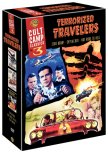| Reviews & Columns |
|
Reviews DVD TV on DVD Blu-ray 4K UHD International DVDs In Theaters Reviews by Studio Video Games Features Collector Series DVDs Easter Egg Database Interviews DVD Talk Radio Feature Articles Columns Anime Talk DVD Savant Horror DVDs The M.O.D. Squad Art House HD Talk Silent DVD
|
DVD Talk Forum |
|
|
| Resources |
|
DVD Price Search Customer Service #'s RCE Info Links |
|
Columns
|
|
|
Cult Camp Classics Vol. 3 - Terrorized Travelers (Zero Hour!, Hot Rods to Hell, Skyjacked)
Warner Bros. has packaged together three interesting cult titles concerning menaced travelers under their new Cult Camp Classics line of DVDs. While the inclusion of the word "camp" in their moniker Cult Camp Classics Vol. 3: Terrorized Travelers is bothersome to me (there are so many connotations now associated with the word "camp," many of them hazily applied today, and of which few or any really apply to these films), I recognize it as a smart, canny marketing move on Warner's part to sell films that may have had a tough time finding decent sales on their own. While certainly none of the films included here qualify as cinematic masterpieces, only one really has elements of what one might call "camp" (Hot Rods to Hell), and even in that instance, it might be more accurate to describe the film in terms of typical 1960s "exploitation cinema." With the other two films, Zero Hour! is strictly "camp-by-association" (due to it being ripped off mercilessly for Airplane!), while Skyjacked is a relatively straightforward actioner with some 1970s disaster movie conventions that new viewers may laugh at - especially if they're encouraged to do so with the film incorrectly labeled as "camp."
ZERO HOUR!
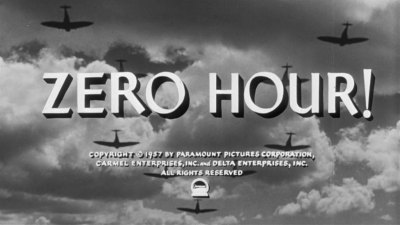
Zero Hour! tells the tense story of a Ted Stryker (Dana Andrews), a former Canadian WWII fighter pilot and squadron leader who's battling horrific memories of his war experience. Having indirectly killed six of his men due to an error in judgement (going for a primary target, Stryker leads his men too low in a fog bank, where they crash into the ground), Stryker has been unable to shake this devastating memory, which has caused him no end of trouble in his post-war personal life. Unable to hold onto a steady job, Stryker's marriage is now about to end. Coming home after finally winning another chance at a job, Stryker finds a note from his wife, Ellen (Linda Darnell), telling him that's she's leaving him and taking their young son Joey (Raymond Ferrell). Stryker catches up with the plane before it departs, and rides along, hoping to convince Ellen to come back with him now that "things will be different."
Unfortunately, disaster strikes when passengers start to come down with severe food poisoning from tainted fish. Ted and his wife are fine, having ordered the lamb, but young Joey is critically ill, as are many on board - including the pilot, Captain Bill Wilson (Elroy "Crazylegs" Hirsch) and First Officer Walt Stewart (Steve London). Although there's a doctor on board, Dr. Baird (Geoffrey Toone), there's little he can do but instruct Stewardess Janet Turner (Peggy King) to find anyone who can fly the plane. But when Stryker is brought into the cockpit, he's terrified of the challenge before him - as well as riddled with self-doubt after years of personal failure. Convinced there's no other option, he takes control of the plane, with his wife helping out on the radio. As a vicious rain and ice storm rages outside (preventing them from landing in Calgary and forcing them over the mountains to Vancouver), Captain Martin Treleaven (Sterling Hayden), a former colleague of Stryker's during the war, tries to hide his contempt and defeatism as he attempts to talk Stryker down through the difficult flight and almost impossible landing.
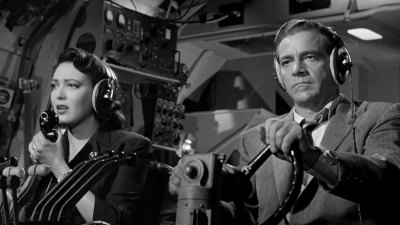
If the film Airplane! had never been made - of which, by the way, I'm a huge fan - 1957's Zero Hour! might have been remembered as a competent, straightforward thriller that Paramount put out to ride the wave of John Wayne's earlier successful airplane disaster flick, The High and the Mighty. Watching the film now, though, it's almost impossible to enjoy it on its own terms because the viewing experience has been polluted by the ubiquitous influence of Airplane!'s popularity. Entire situations and lines of dialogue featured in Airplane! were lifted whole cloth from Zero Hour!, with the resolutely serious Zero Hour! now coming off as intermittently hysterically funny - and by no fault of its own. When Captain Wilson asks Joey Stryker if he's ever been in a cockpit before, what are you supposed to do but laugh now? And when Sterling Hayden, in a performance that might be the only "camp" element in the film (or just plain bad acting), ponders that maybe he picked the wrong week to give up smoking, or that he'd like to buy Ted a drink and shake his hand, you're paralyzed with laughter, but only because you're remembering the exact same scenes and lines that were lifted for Airplane!.
Taken on its own, and gallantly trying to block out the numerous viewings of Airplane! over the years, Zero Hour! is a surprisingly effective and competent thriller that benefits from a clean, focused narrative with plenty of technical jargon (courtesy of future Airport author Arthur Hailey). Dana Andrews, always an underrated actor, had by this time fallen out of the top line of "A" list actors, and his tense mask of a face is quite effective in liming Stryker's nervous, self-doubting, self-hating loser. Stryker, who's committed the worst sin any "Greatest Generation" war vet could perpetrate - he's failed to live up to his responsibilities as a nation builder and family man, squandering his military training - is the key element to the film working. Technically, the film is more than competent, with tight editing and lensing by director Hall Bartlett that builds the suspense nicely (there's a great moment where the pilot remembers eating the fish, with Bartlett cutting to a shot of Joey breaking his toy airplane). However, it's Stryker's character, and his eventual salvation through a willingness to quit being a self-doubter, that holds the picture together. Far from "camp," Zero Hour! is a nicely serviceable, unpretentious thriller that unfortunately has the specter of a much more famous spoof hanging over its shoulder.
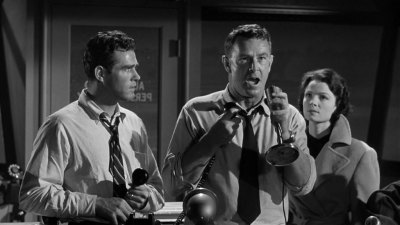
The DVD:
The Video:
Warner Bros. presents Zero Hour! in an absolutely pristine matted widescreen, 1.85:1 enhanced for 16x9 TVs black and white print that's free of any compression issues. Except for some grain and scratches from the isolated stock footage shots used in the film, Zero Hour! looks amazingly good.
The Audio:
The Dolby Digital English mono soundtrack accurately represents the original theatrical presentation. English and French subtitles, as well as close-captioning options, are available.
The Extras:
There's an original trailer for Zero Hour! included, but that's all. I do like the fact that the original poster artwork is used for all three titles here in the Cult Camp Classics Vol. 3: Terrorized Travelers.
Final Thoughts:
Competent, efficient, and fairly tense, Zero Hour! would have just been another serviceable thriller from Hollywood's past had the boys from Airplane! picked some other movie to rip off. As it stands, it's almost impossible to enjoy Zero Hour! now without Airplane!'s hilarious jokes polluting the viewing experience, but try anyway -- it's a decent little disaster thriller, despite its "camp-strictly-by-association" reputation.
HOT RODS TO HELL
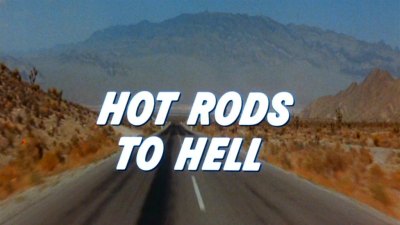
Hot Rods to Hell tells the story of traveling businessman Tom Phillips (Dana Andrews again), who's been critically injured in a car accident on Christmas Eve night. While not paralyzed, Tom's back has been severely strained, forcing him to give up his career of traveling up and down the Eastern seaboard. But the injury has done more to Tom's mind than his back (shades of Zero Hour!), causing Tom to be querulous and anxious, doubting his own confidence and making him a moral coward. Trying to help him, his wife Peg (Jeanne Crain, in a hilariously unrestrained performance) enlists the aid of Tom's brother Bill (Harry Hickox) to throw in and buy a thriving motel out in the western desert, hoping to aid Tom's recovery and give him a new start in life. While Tom is doubtful, Peg gently guides him to the conclusion that running the motel is the only way for Tom to leave behind all the bad memories of his accident, and get on with his life.
Traveling by car out in the desert, the Phillips encounter a bunch of thrill-kill punks who get their kicks out of scaring innocent people. Led by adrenalin-junkie Gloria (Mimsy Farmer) and cold-as-ice rapist Duke (Paul Bertoya), these "animals" as Tom calls them engage in ever-increasing threats against the square Phillips family; starting with a deliberately thrown beer can at young Jamie Phillips (Tim Stafford). As the punks smell a coward in Tom, they up the antes in their cat-and-mouse games, especially after learning that Tom has bought their favorite decadent hang-out, The Arena, a bar attached to the Dailey Motel that Tom now runs. Meeting the slightly gamey Lank Dailey (George Ives), Tom decides to run away from the obvious trouble that will come every night from Duke and his gang at their favorite watering hole. It doesn't help that Tom's daughter, bored-to-tears Tina (Laurie Mock) has been defending the brutes all throughout their encounters, and now has become, against her better judgement, attracted to Duke. Will Tom run away from the deadly "chicken runs" that Tom threatens, or will he stand up to the vicious gang?
Watching Hot Rods to Hell today (I've caught bits and pieces of it at least ten times; they used to run it constantly on AMC and TCM), the first thing that always stands out is how clean-cut those thrill-kill punks really are; with their neatly combed pompadours, Pendleton shirts, straight-leg chinos and penny-loafers, they look more like the Welcome Wagon from the Young Republicans League rather than vicious, amoral animals out for go-go-go kicks. But I suppose that was the intention behind producer Sam Katzman and writer Robert E. Kent's story: despite all their advantages (Charley, the gas station attendant says Duke and Ernie come from the richest folks in the area), these kids have nothing to do or strive for except mindless thrills and kicks. I've read where this was originally intended for television (that may also explain why the gang is so clean-cut), but clearly, this is mid-1960s drive-in exploitation all the way.
Katzman is careful throughout the picture to throw bones out there to the "civilized" crowd (i.e.: families that caught this on the bottom of a double-bill somewhere), lamenting the fact that these punks are directionless and morally bankrupt, and that society is wise to their games and looking to squash their dangerous antics (Paul Genge's Highway Patrolman officer frequently pops up to give a lecture on the dangers of a too-loose society). Katzman wants to make sure that the Moms and Dads out there understand that this is an isolated problem that can be stopped if we all have the courage to confront these animals (how many suburban Dads girded their loins before pulling out of that drive-in, muttering under their breath, "Just let some punk try that with me!").
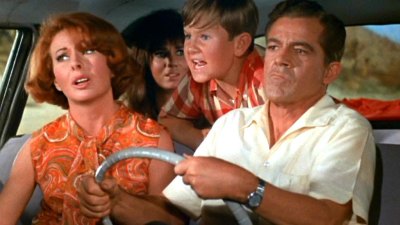
But to his credit, Katzman also makes sure to spread the blame around, not only indicting the road punks who menace innocents on the road, but society as a whole. When the Phillips hang out at a roadside picnic area, hoping that Duke and Ernie and Gloria will get tired and move along, they encounter an obnoxious middle-class "straight" family that Katzman and Kent viciously send up. The father (the always wonderfully grating William Mims) is a drunk who speeds through the picnic area without a thought in the world that he might kill a child playing nearby. Given a ticket by Officer Bill, he contemptuously waves it in front of the cop, sneering that his auto club will take care of it for him. Later, screenwriter Kent has the man killed in a roadside accident, the victim of his own recklessness. If square suburban family men like this drive erratically, under the influence of alcohol like Duke and Gloria, can you really single out the punks threatening the Phillips as the only menaces on the roads? As well, Kent and Katzman also make sure you know that Duke and Ernie and Gloria's parents are all social drinkers, too, who get their "kicks" by getting drunk every night at each others' homes.
But let's not get too serious about Hot Rods to Hell. Those cliched sociological and psychological sops devised by Kent and Katzman may flesh out Hot Rods to Hell, giving it a bit of welcome depth among the crowd of drive-in trash frequenting the screens in 1966, but it still remains resolutely (and delightfully, I might add), exploitation fare through and through. And fairly competent junk, at that. Certainly the most interesting aspect of the film is the Gloria character, played by veteran exploitation goddess Mimsy Farmer. Hilarious when after finishing having sex with Duke, she contemptuously throws his shirt at him and immediately demands, "Where are we going now?" (certainly a valid "camp" moment if there ever was one in the film), Kent and Katzman give a surprisingly well-rounded look at this bored, sex-crazed kitten, illustrating her frustrations with small-town life, her boredom and fury at the philandering Duke, and her crazy, jazzed-up penchant for dangerous thrills to compensate for her stilted existence, with fairly good results (hey wait - am I getting serious again about Hot Rods to Hell???).
Hot Rods to Hell may be a tad too stretched out (there are just a few too many scenes of Tom battling the hoods on the roads, along with the rather pointless dwelling on musical numbers by Mickey Rooney, Jr. and His Combo at the Arena). And there's some fuzzy exposition about what exactly Dailey was letting go on at the motel, as well as how Tina's unspoken desires and frustrations fit in with the family's encounters with Duke and his gang, but all in all, Hot Rods to Hell delivers exactly what it promises: fast cars, faster women, and the vicarious thrills of watching jazz-crazed psychos torment a poor innocent American family, all within the confines of a safe, color-soaked G-rated drive-in flick.
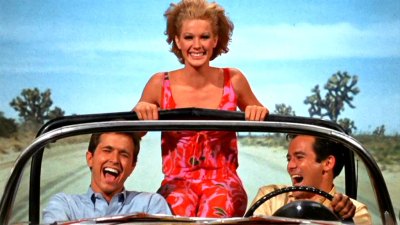
The DVD:
The Video:
Hot Rods to Hell looks astonishingly good here in a matted widescreen, 1.85:1 enhanced for 16x9 TVs transfer. If you've only seen this on TV, you're going to be knocked out by the garish color (speaking of garish, let's go a little easy on Dana Andrew's rouge, mascara and eyeshadow, okay boys?) and the crisp, clean compositions.
The Audio:
The Dolby Digital English mono soundtrack accurately represents the original theatrical presentation (in fact, I'm sure it sounds much better now than when it was coming through that little window speaker at the drive-in). English and French subtitles, as well as close-captioning options, are available.
The Extras:
There's a hyped-up original theatrical trailer for Hot Rods to Hell included.
Final Thoughts:
Producer Sam Katzman always threw in a little sociology and psychology in his exploitation fare, and Hot Rods to Hell is no different. Nicely dense at times as far as characterizations, Hot Rods to Hell is still humorously dense in the head, and all the more welcome for that. An entertaining little slice of drive-in history, Hot Rods to Hell is crazy-kill fun through and through.
SKYJACKED
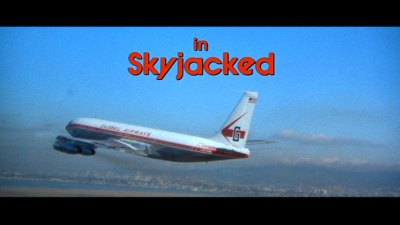
Skyjacked tells the story of a commercial Boeing 707 being hijacked to Moscow by a crazed Vietnam vet. Captain Hank O'Hara (Charlton Heston) is instrumental in getting officer Jerome K. Weber (James Brolin) on his flight to Minneapolis, after Gary Brown (Rosie Grier) is kind enough to offer his extra seat to the Army officer (Weber was on stand-by, and Brown always buys an extra seat in First Class for his cello). We're introduced to various First Class passengers boarding Captain O'Hara's flight, including Arne Lindner, a United States Senator (Walter Pidgeon) and his son Peter, (Nicholas Hammond); Elly Brewster, a beautiful hippie chick (Susan Dey); Harold Shaw, a nervous businessman (Ross Elliott) and his lovely wife Clara (Jeanne Crain again); the requisite pregnant traveler, Harriet Stevens (Mariette Hartley); as well as the flight crew: stewardess Lovejoy Wells (Leslie Uggams), co-pilot Sam Allen (Mike Henry), and head stewardess Angie Thacher (the always wonderful Yvette Mimieux).
When Elly Brewster finds a lipstick-written warning in the bathroom, of a bomb planted on the plane, suspicions immediately fly as to who is the mad bomber on board. The warning also demands that the plane reroute to Anchorage, Alaska. Quickly it becomes evident to jazz cellist Gary Brown that his seatmate Weber is dangerously unhinged, and once the plane lands in fog-laden Alaska (after a hairy talk-down with Claude Akins' radar expert Sergeant Ben Puzo), Weber takes control of the plane, viciously attacking the remaining passengers (O'Hara wisely instructed Angie to get as many passengers in the back of the plane off the airliner while Weber was preoccupied up front). Now, it becomes a battle of wits between the steely, determined O'Hara and the crazed, clearly psychotic Weber as his instructs O'Hara to fly the plane to Moscow.
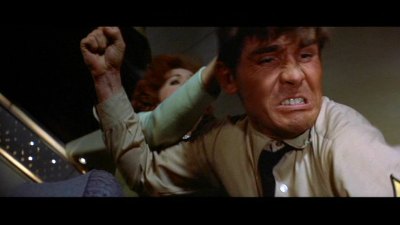
Coming out in 1972 as an obvious attempt to cash in on the phenomenal success of Universal's Airport in 1970, MGM's Skyjacked maintains a few of the tenants of the coming disaster film cycle that Airport reinvigorated (such as the stock characters introduced to the audience to generate sympathy once the mayhem starts). However, it largely bypasses the gloss, class distinctions, romance and self-consciously humorous shtick that defined Airport to instead create a nerve-wracking, clean, polished, gritty little thriller that works as a solid suspense story. Stock character may be introduced, but they aren't picked off one by one, nor are they held up as stereotypical examples of various audience templates ("Oh, she's the Thief; he's the Complainer"). They're never singled out for varying degrees of audience sympathy, depending on what the mad bomber does to them, unlike other disaster films where the pecking order of the stars' billing (as well as their character's social status) determines the order of the body count. There's a brief, intense scene where the various passengers try to subdue Weber; all of them attempt to stop him, but none succeed, not even mammoth Rosie Grier can counter Brolin's primitive, vicious jungle martial arts. One shot in particular is visceral, with Jeanne Crain desperately hitting Brolin, trying to get him off her husband who has a lockgrip on Brolin's bag. You'd never see such violent physical reactions by stars in other disaster movies from this era, as you do in this scene from Skyjacked.
But that's what works so well in Skyjacked; it doesn't "camp" up, if you will, the dramatics of the story. This is a straightforward, simple, mean suspense thriller, extremely well told by director John Guillermin and screenwriter Stanley R. Greenberg (Soylent Green and The Missiles of October), and unpretentiously unembellished. I've always been a big fan of the underrated director Guillermin. Of course most people probably know him from his co-directing duties on future disaster movie king The Towering Inferno, but many of Guillermin's action films have a clean, cold, professional steel to them that are admirably free of histrionics (The Bridge at Remagen, The Blue Max), much like Skyjacked. Guillermin resists the temptation that many of these airline disaster films indulge in by glamorizing the plane itself. Here, the cockpit is remarkably small looking and cramped (as they are in real life), not the expansive-looking technological wonders you usually see on the screen. Big Heston often has trouble even getting in and out of his seat, and that works wonders with humanizing him in his fight against Brolin. As well, the rest of the plane isn't treated as some kind of glamour limo, where the audience can indulge in some wish-fulfillment fantasies of travel before getting down to the action; it looks mundane and routine here, and cramped as well, even in First Class, further heightening the nasty, claustrophobic action once Brolin starts to flip out on the other passengers. Even when Guillermin has the chance to show off the Boeing 707 in establishing shots, he opts instead to give us these truly awe-inspiring shots of the plane bobbing and weaving in the air, performing powerful turns. This plane isn't the languorous, gleaming Boeing you see in Airport 1975, the one that give us a break from the suspense; instead, Skyjacked's plane shots, often in dark grey skies, illustrate the almost ugly beauty and immense power of these airplanes, making it seem a much more realistic - and dangerous - machine to fly than we'd probably like to imagine.
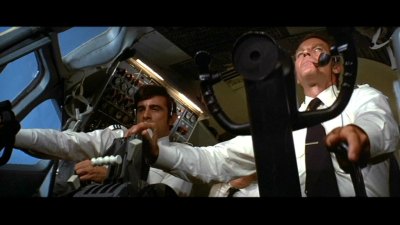
While some of the acting in Skyjacked leaves a little to be desired (Grier, though likeable, is never really too believable in his role), Heston and Brolin have a good duet of father/son psycho-dynamics going on that further enlivens Skyjacked. Heston, nicely restrained and in control, doesn't indulge in his sometimes hammy shtick seen in some of his later films. Brolin didn't get a lot of credit from the critics for his performance here, and certainly, there's an element of eye-rolling and grimacing to it that some viewers today may find amusing. But I find his energy here quite good, with the extra level of nastiness he brings to the Weber character played well off Brolin's established good-guy persona (for Marcus Welby, M.D. fans in 1972, his turn here was a bit of a shock). When Brolin strides down the red-carpet of one of Guillermin's The Manchurian Candidate-inspired dream/psychotic episode sequences, his over-eager smile sickly pasted on his sweating, pale face, he's perfectly in key with Guillermin's intentions.
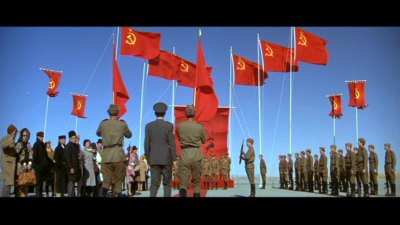
The DVD:
The Video:
Looking sensational in a perfect letterboxed widescreen, 2.35:1 enhanced for 16x9 TVs transfer, Skyjacked didn't look this good in theaters when I saw it as a kid (both at the drive-in and at a hardtop).
The Audio:
The Dolby Digital English 2.0 stereo mix is a step up from the other two releases in this boxed set, and a welcome one.
The Extras:
Criminally, there isn't even a trailer for Skyjacked included here. Nothing.
Final Thoughts:
Far from "camp," Skyjacked is a straightforward, clean, nasty-edged little thriller, expertly directed by action pro John Guillermin, and effectively thesped by Charlton Heston and James Brolin. It's been forgotten since it came out, but if you're in the mood for a tight little actioner in the disaster film vein, you'll be surprised at how adept Skyjacked is at achieving its goals.
Final Thoughts on the Boxed Set:
Cult Camp Classics Vol. 3: Terrorized Travelers may not be appropriately titled, but there's no denying that the three films included -- Zero Hour!, Hot Rods to Hell, and Skyjacked - provide some heavy-duty, guilt-free action and exploitation enjoyment. Sensational transfers compensate for a lack of extras, and at that price, Cult Camp Classics Vol. 3: Terrorized Travelers is a steal. I highly recommend Cult Camp Classics Vol. 3: Terrorized Travelers.
Paul Mavis is an internationally published film and television historian, a member of the Online Film Critics Society, and the author of The Espionage Filmography.


|
| Popular Reviews |
| Sponsored Links |
|
|
| Sponsored Links |
|
|
| Release List | Reviews | Shop | Newsletter | Forum | DVD Giveaways | Blu-Ray | Advertise |
|
Copyright 2024 DVDTalk.com All Rights Reserved. Legal Info, Privacy Policy, Terms of Use,
Manage Preferences,
Your Privacy Choices | |||||||









